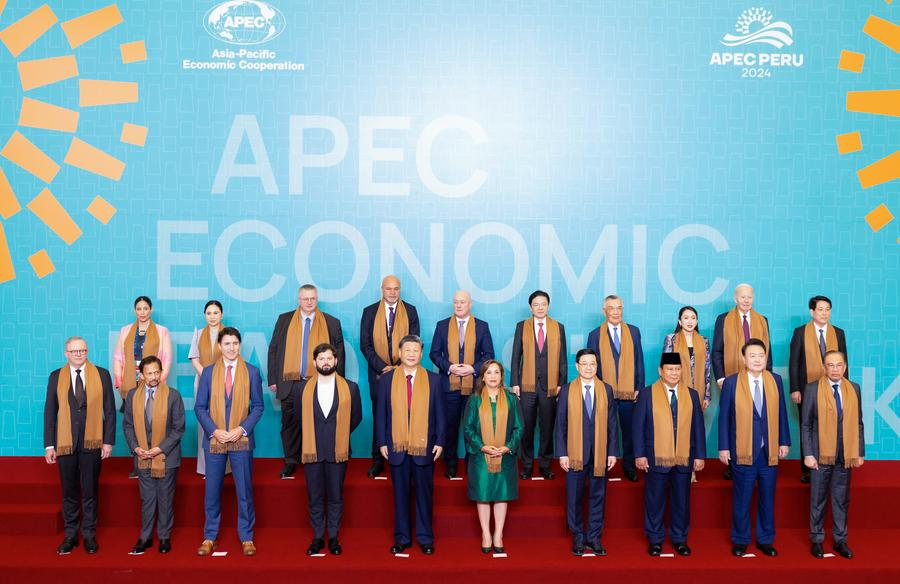
When China first hosted the Asia-Pacific Economic Cooperation (APEC) summit in 2001, the nation was at a crossroads, ready to join the World Trade Organization.
It was a transformative moment that signaled China’s readiness to fully enter the global economic arena.
When China hosted APEC again in 2014, it was a very different story. The country had become an economic powerhouse, with its deeper integration into the world economy sparking a decade of impressive growth.
Now, China is ready to play host again with an important mission: uniting Asia-Pacific countries to champion open economic and trade cooperation while rejecting protectionist and confrontational trade tactics.
On Saturday, Chinese President Xi Jinping, in a speech during the 31st APEC Economic Leaders’ Meeting, held in Lima, capital of Peru, announced that China would welcome APEC leaders to his country in 2026.
“We hope to work with all parties to deepen Asia-Pacific cooperation for the benefit of the people of the region,” Xi said.
Its experience as two-time APEC host shows that China can promote consensus, said Ambassador Carlos Vasquez, chairman of the APEC Council of Senior Officials in 2024.
“China played a very important role, together with some other very important economies (…) to achieve consensus again since the beginning of APEC year 2024 here in Peru,” said Vasquez.
China will play a key role in strengthening the APEC forum in 2026 when it takes on the role of host, just as it demonstrated during its successful leadership in 2014, he said.
During his speech, Xi called on APEC economies to “act with solidarity and cooperation to face challenges, fully realize the Putrajaya Vision 2040, build an Asia-Pacific community with a shared future, and usher in a new era in Asia’s development -Pacific”.
The Putrajaya Vision 2040, adopted by APEC leaders in 2020, envisions “an open, dynamic, resilient and peaceful Asia-Pacific community by 2040, for the prosperity of all our people and future generations”.
However, this vision of shared prosperity and lasting stability faces growing challenges.
Geopolitical tensions, coupled with economic disruptions caused by unilateralism, protectionism and attempts at “decoupling” and “de-risking” have created unprecedented pressures on the region’s stability and growth.
“We must remain committed to multilateralism and an open economy, firmly defend the multilateral trading system with the World Trade Organization at its core, fully revive APEC’s role as an incubator of global economic and trade rules, and promote regional economic integration and connectivity,” Xi said.
In interviews with Xinhua, experts and officials from the Asia-Pacific region noted that China’s remarkable success through high-quality opening-up has given it a deep understanding of the importance of an open global economic system and the critical need to promote multilateral cooperation and win-win.
As one of the leading countries in the Asia-Pacific region, China has “consistently adhered to a development path that aligns with APEC’s spirit of openness, inclusiveness and mutual benefit,” said Woo Su-keun, director of the Institute of Eastern Studies Asian from Korea.
“It is more important for countries to demonstrate strong leadership through concrete actions rather than words,” Woo said.
For Ong Chong Yi, executive director of the Malaysian think tank Belt and Road Initiative Committee for Asia-Pacific, China has opened its market to offer development opportunities to countries in the region, driving inclusive economic growth within the Asia-Pacific.
“At the same time, China actively supports infrastructure development in developing countries, improving connectivity and economic and social inclusion across the region. These efforts create more opportunities for shared progress and prosperity,” he said.
In his speech on Saturday, Xi emphasized the need to make green innovation a catalyst for the Asia-Pacific region.
“We need to promote coordinated digital and green transformation and development to create new momentum and new drivers for Asia-Pacific development,” Xi said, calling for promoting an open, fair, equitable and non-discriminatory ecosystem for innovation.
China is one of the largest and most important investors in helping the world realize green transformation, said Nikorndej Balankura, spokesperson for Thailand’s Ministry of Foreign Affairs.
China is also helping countries in the Global South and many others develop sustainable green economies, he added.
(Credit: Xinhua)
Source: https://www.chinahoje.net/china-sediara-cupula-2026-da-apec-e-defendera-cooperacao-da-asia-pacifico/

